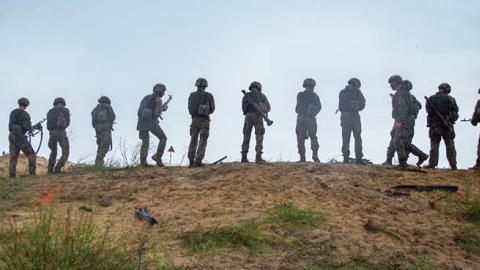For decades, the basic premise of North Atlantic Treaty Organization (NATO) and European Union enlargement was the conviction that countries should freely determine their policies in peaceful coexistence with their neighbors. In a major address in Mainz, Germany in 1989, President George H.W. Bush gave this belief a slogan: “Europe whole and free.”
To Russian President Vladimir Putin, however, that premise is clearly unacceptable. He believes that Russia should command a sphere of influence in which his European neighbors aren’t entirely sovereign. This sets up a clash in those front-line states bordering Russia, which are also partners, or even allies, of the United States. Regarding Ukraine, President Biden now faces a choice: Is he committed to the decades-long U.S. vision of a free Europe, or is he willing to accept a Russian sphere of influence?
In June, three months after Biden issued his Interim National Security Strategic Guidance to promote the belief “that democracy holds the key to freedom, prosperity, peace and dignity,” Putin published a widely read essay, dubbed by some an invasion manifesto, that described the “harsh and artificial division of Russians and Ukrainians” as “the use of weapons of mass destruction against us.” In December, as the U.S. president convened an international Summit for Democracy, Putin ordered a major military buildup along the Ukrainian border. Putin is confronting Biden’s words and actions in a test of wills — and the results to date are discouraging.
Putin has lured Biden into a trap by preying on the ingrained view, prevalent among progressives, that de-escalation is the height of diplomacy. By manufacturing a crisis, Putin has enticed Biden into talks on the costs of de-escalation, which Putin has priced as a Russian say over Ukraine, if not Eastern Europe altogether. Biden’s reaction has only confirmed Putin’s view that he’ll be met with talks, rather than reprisals. “We’re having meetings at a higher level [with Russia to explore] whether or not we can work out any accommodation as it relates to bringing down the temperature along the eastern front,” Biden told reporters recently.
Putin’s aggression is predicated on Biden’s weakness. Upon taking office, Biden chilled relations with both Eastern Europe’s most important country, Poland, and its most obvious Russian target in Ukraine. Instead, he embraced Germany and sought to repair ties with Berlin by waiving sanctions against the Nord Stream 2 pipeline, which snakes across the Baltic Sea directly from Russia to Germany, bypassing Ukraine in the process.
Biden is now doubling down on this posture. His team is coordinating a response with our Western European allies, chief among them Germany, and issued threats of transatlantic economic sanctions should Russia launch an incursion. Putin is operating under the assumption, likely correct, that Washington will not take any steps that put it significantly at odds with Berlin.
This poses a problem. After 16 years with Angela Merkel at the helm, Germany is now led by the Social Democratic Party, whose upper ranks are known for soft-pedaling Moscow. Berlin has balked at supplying Kiev with defensive weapons, reportedly blocking such transfers at NATO recently, and it long has opposed Ukraine’s path to NATO membership, famously vetoing such a step at a summit meeting in 2008. In his first major address before the Bundestag last week, the new German chancellor, Olaf Scholz, called for “constructive dialogue” with Russia while warning the Kremlin of major economic consequences — “high costs,” as he put it — should it invade further.
It is not hard to imagine Biden delivering a similar speech with only cosmetic alterations. Already, Biden has dismissed a military option, declaring that he will not deploy U.S. troops to Ukraine, and slow-rolled the provision of military equipment to Kiev. That many of the same officials at the helm in Washington today served in government when Putin annexed Crimea in 2014 will not have been lost on Moscow, either. The U.S. insists that it rejects spheres of influence, but Putin sees only a feckless and weak U.S. administration.
This is not the first time that Biden has played his hand poorly against Putin. During their summit meeting in Geneva last summer, Biden passed Putin a list of critical infrastructure he considered a "red line" for hacking, essentially green-lighting the Kremlin’s attacks on everything else. Now, to the consternation of much of Eastern Europe, he has made explicit the limits of U.S. military support for Ukraine.
Putin views himself in an advanced stage of conflict with the West. He will not be deterred by the threat of economic sanctions, especially given Europe’s addiction to Russian natural gas. Moreover, the reported agreement between Washington and Berlin to shut down the Nord Stream 2 pipeline in case of an Russian invasion is hardly sufficient. The purpose of the pipeline is to undermine Ukraine. To target it only after Russian aggression is like threatening to seize an attacker’s rope after he has fired his handgun. Once Ukraine is destabilized, the pipeline will lose its importance.
Putin has probed Biden’s commitment to Ukraine and discovered it hollow. For all of Biden’s emphasis on democracy, the world is awaking to the realization that his commitment to a Europe whole and free may end where Russia says its sphere of influence begins. Far from deterring Putin, Biden is emboldening him — and, at some point, Ukraine will pay the price.
Read in The Hill


















